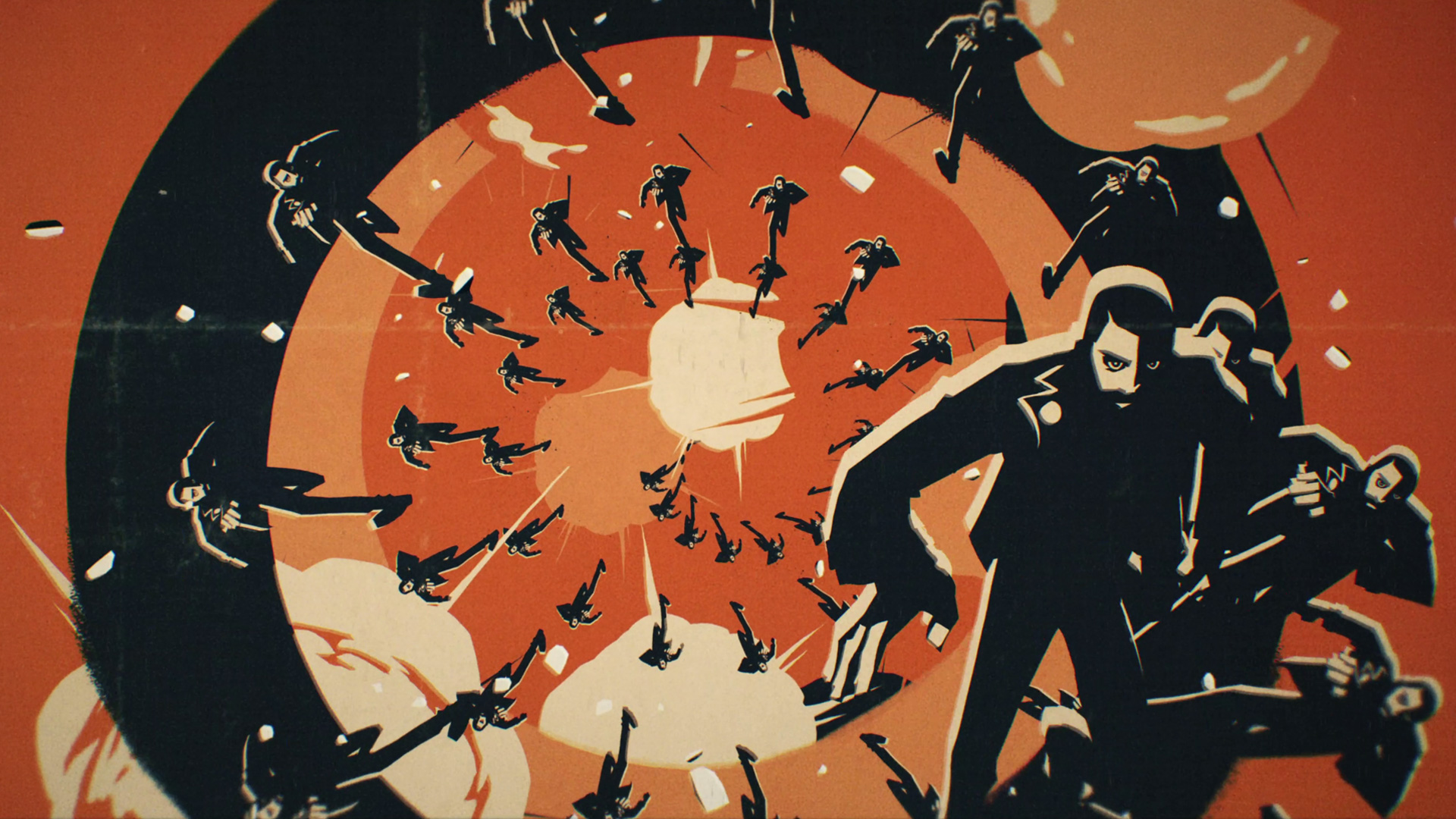
Somebody once said that the number one killer is time. Clearly, that lucky soul never found themselves trapped in a Deathloop; caught in a cycle of violence on Blackreef island, where its residents are free to spend the first day of the rest of their lives in a continuous celebration of death and debauchery. On this isolated refuge of perverted paradise, the number one killer is identified by four letters – but it isn't time, it's Colt. He's the perpetually alive soldier hell-bent on returning to the land of the ageing by any means necessary, no matter the cost.
And there is a cost. There's only one way to break the cycle that has bewitched the island: eliminate the eight Visionaries responsible for maintaining the loop within a single day. Should you miss even a single target before the clock strikes midnight (or die trying), you'll be right back where you started: washed up on the black sand beaches of Blackreef with little more than the clothes on your back and a hazy memory of what will transpire in the hours ahead. This is Deathloop, Arkane Studios' ambitious attempt to define a new generation of first-person shooters.
It's just a matter of time
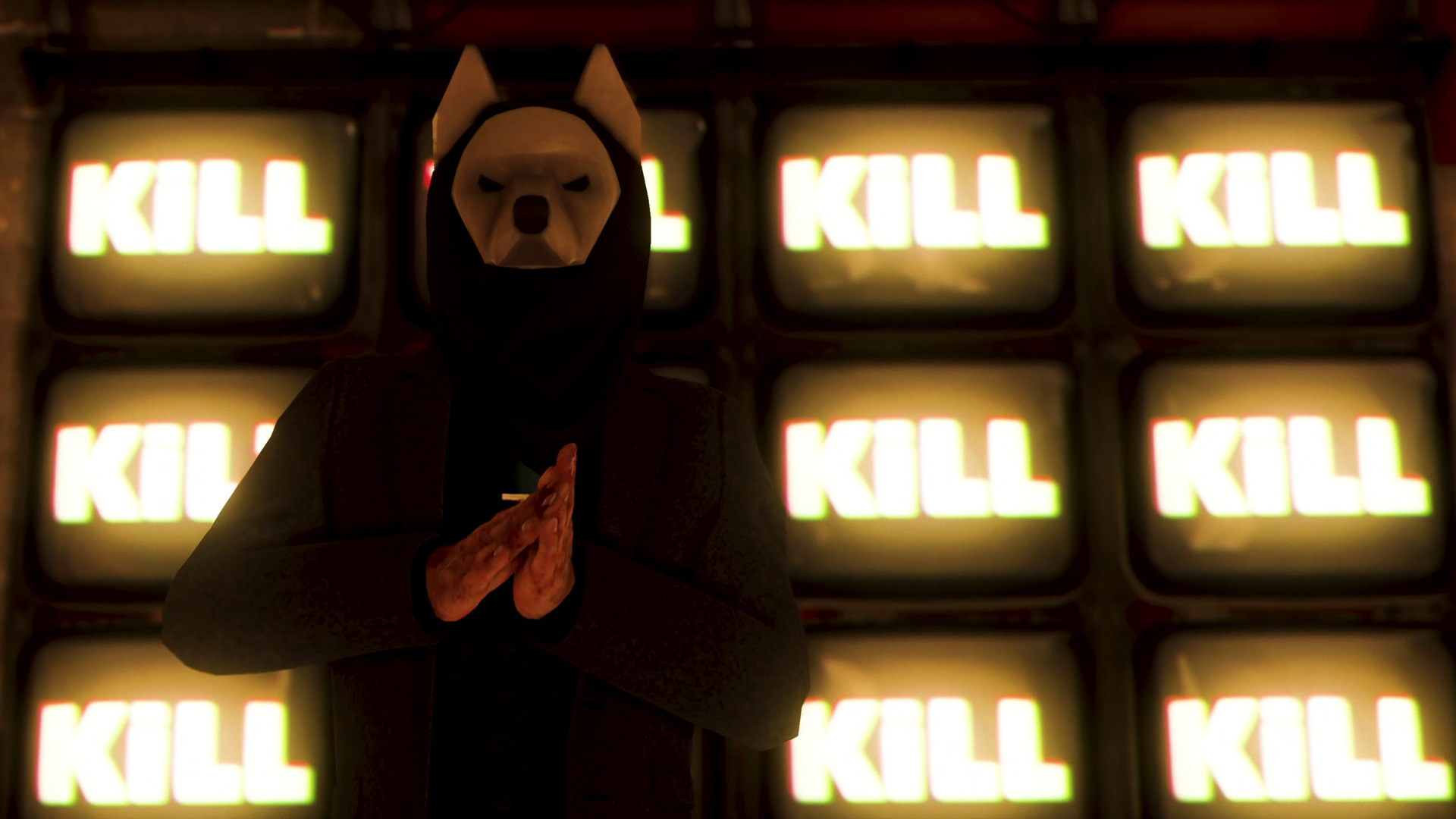
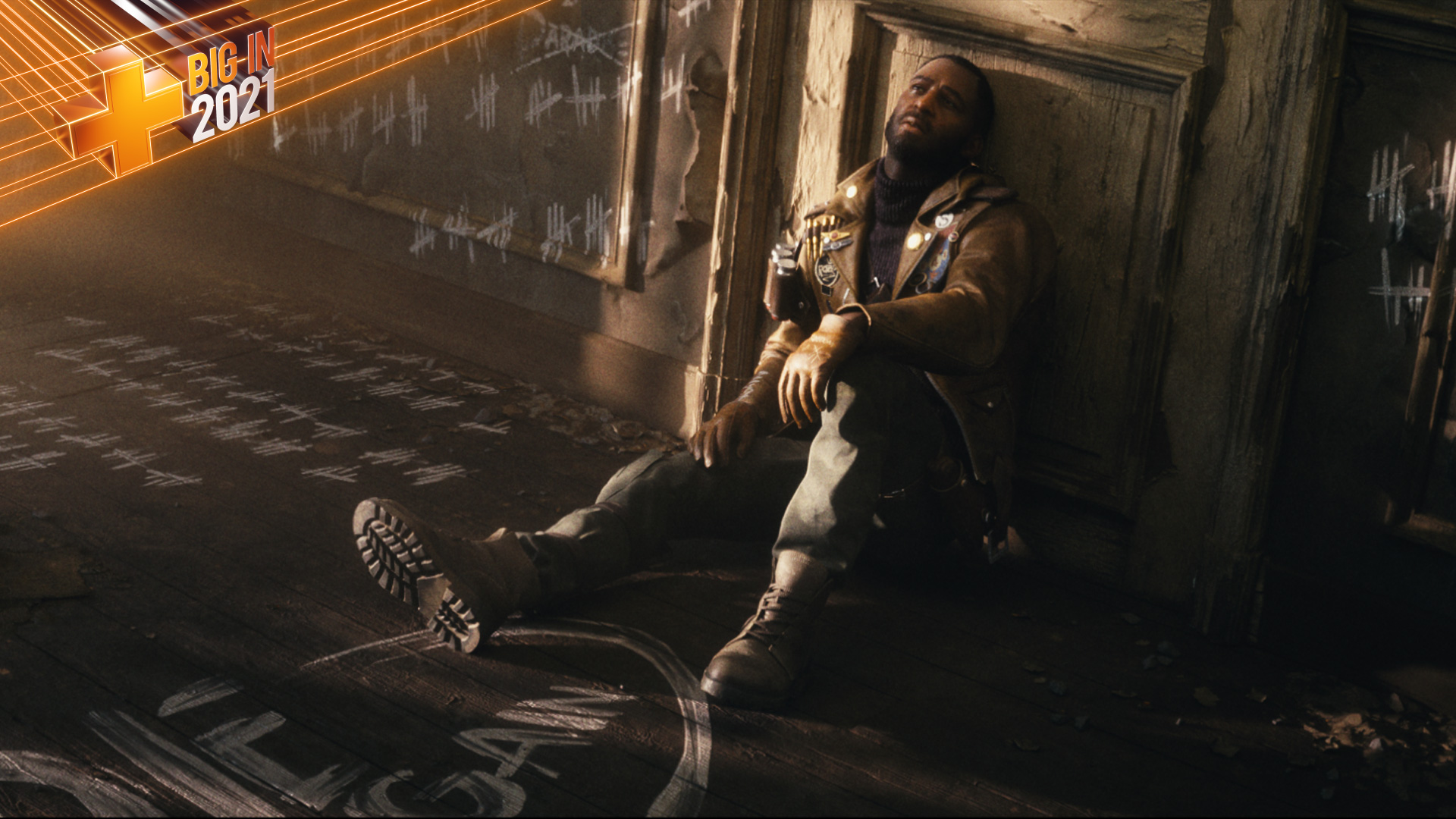
Game Deathloop
Developer Arkane Lyon
Publisher Bethesda
Platforms PC, PS5
Release April 21, 2021
Deathloop is a reverse murder mystery. You aren't tasked with figuring out whodunnit, but rather how to do it. Game director Dinga Bakaba says that Arkane Lyon was eager to experiment following Dishonored 2 and its standalone expansion, Death of the Outsider. What emerged from that period of experimentation and iteration was a more intimate experience, centred around "one big idea, one place, one challenge, one moment in time, and one relationship."
Each of Colt's targets can be found going about their routines and schedules throughout four unique districts, across four distinct periods of the day. You are free to venture into any of these areas during any one of the timeframes, using the loop to learn more about the Visionaries, map the routines of other NPCs, and get a better lay of the land. In Deathloop, knowledge is power.
Eventually, you'll use this information to alter sequences of events. You'll acquire awesome new powers and weaponry. Change the placement of key personnel around the island. And, should you line the dominos up precisely, put the perfect cycle of assassination into motion. "If we're talking about learning everything there is to know about breaking the time loop, it is very open-ended. Activities can be completed in any order, and every situation can be approached in a variety of ways," says Bakaba. "In the end, there is only one solution for how to get out of the time loop. But first, you need to find it. Then you need to perform it. And that isn't necessarily the easiest thing to accomplish."
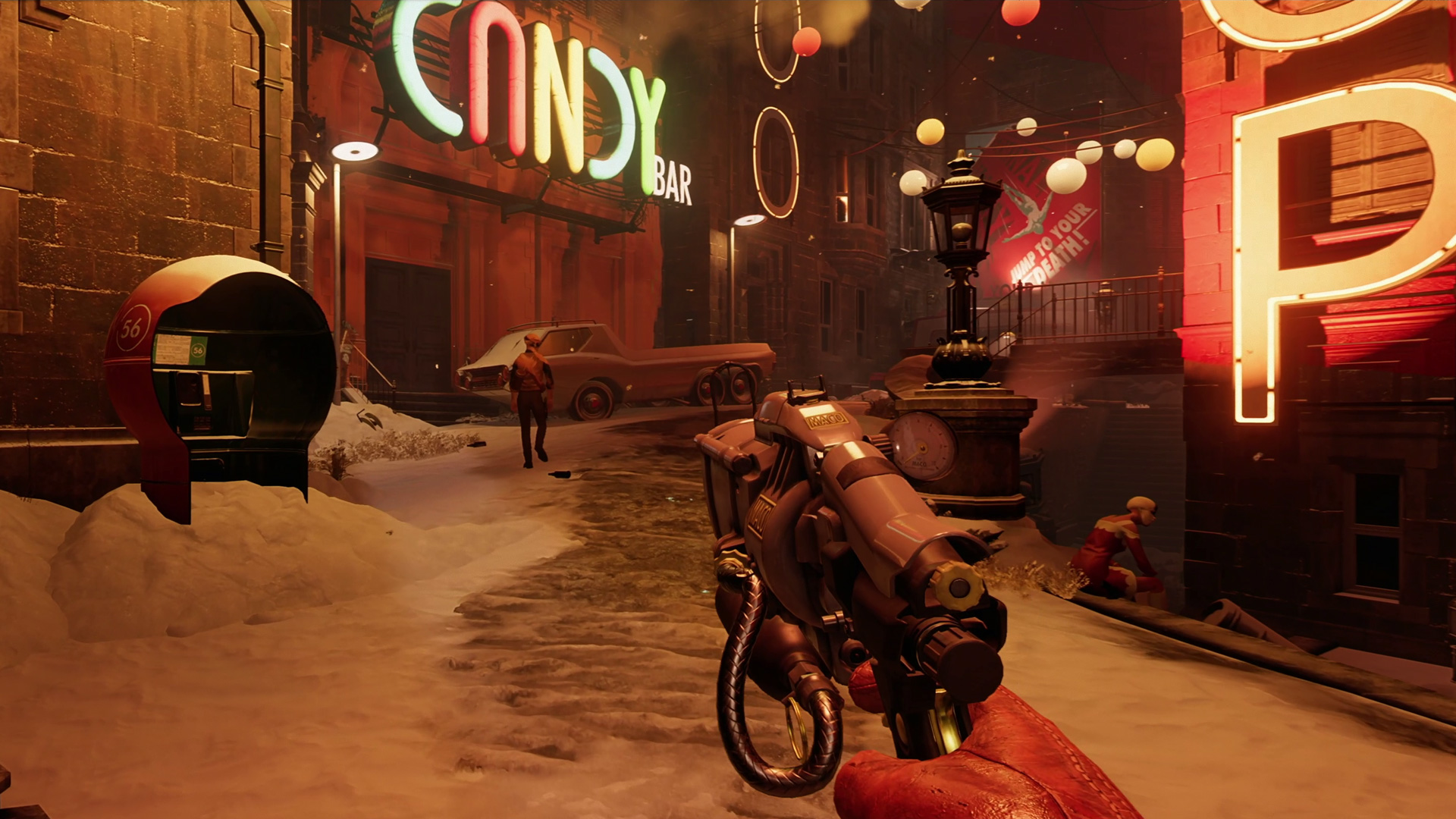

Deathloop leads Big in 2021, GamesRadar's month-long celebration of our most anticipated games of the near horizon. Be sure to check back in every day through January for new previews and exclusive developer interviews.
While you only have a single day to complete the task at hand, you are never working against a literal clock. Arkane considered several approaches to the way time functions – such as the world working in real-time, as it does in IO Interactive's Hitman, for example. The studio settled upon something more abstract and accommodating, for a system that reflects how players like to play Arkane's games: leaving no stone unturned and dutifully experimenting in the spaces.
"There is no time, per se. We didn't want players to be inside a mission and then be super-stressed about the clock. The idea is that there are four periods of the day. You can choose to go to one of each of the four districts and spend as much time as you want there to explore and do various things. When you exit the district, it will move to the next period," Bakaba continues, noting the cycle between morning, noon, and so on. "Deathloop is about making your investigation, following the different threads and leads at your leisure, at your own pace, and approaching the moment-to-moment as you want to."
Weekly digests, tales from the communities you love, and more
For Arkane's art director Sebastian Mitton, one of the principal challenges has been in ensuring that Blackreef offers enough variety and detail that you'll relish the opportunity to return to these spaces. "For us, the challenge is always to make really fun games that have an interesting level design, architecture, and environments. What was hard to design was the fact that time passes in the same environment. That's the main challenge: how to make the same street different each time you visit the area, and to make each area really cool for the four times that you visit it," says Mitton. "When I look back, yeah, we did something really great with Dishonored and Dishonored 2. But the challenge for us was higher in Deathloop because of this tiny, intimate space that we've designed on this small island."
Pushing boundaries
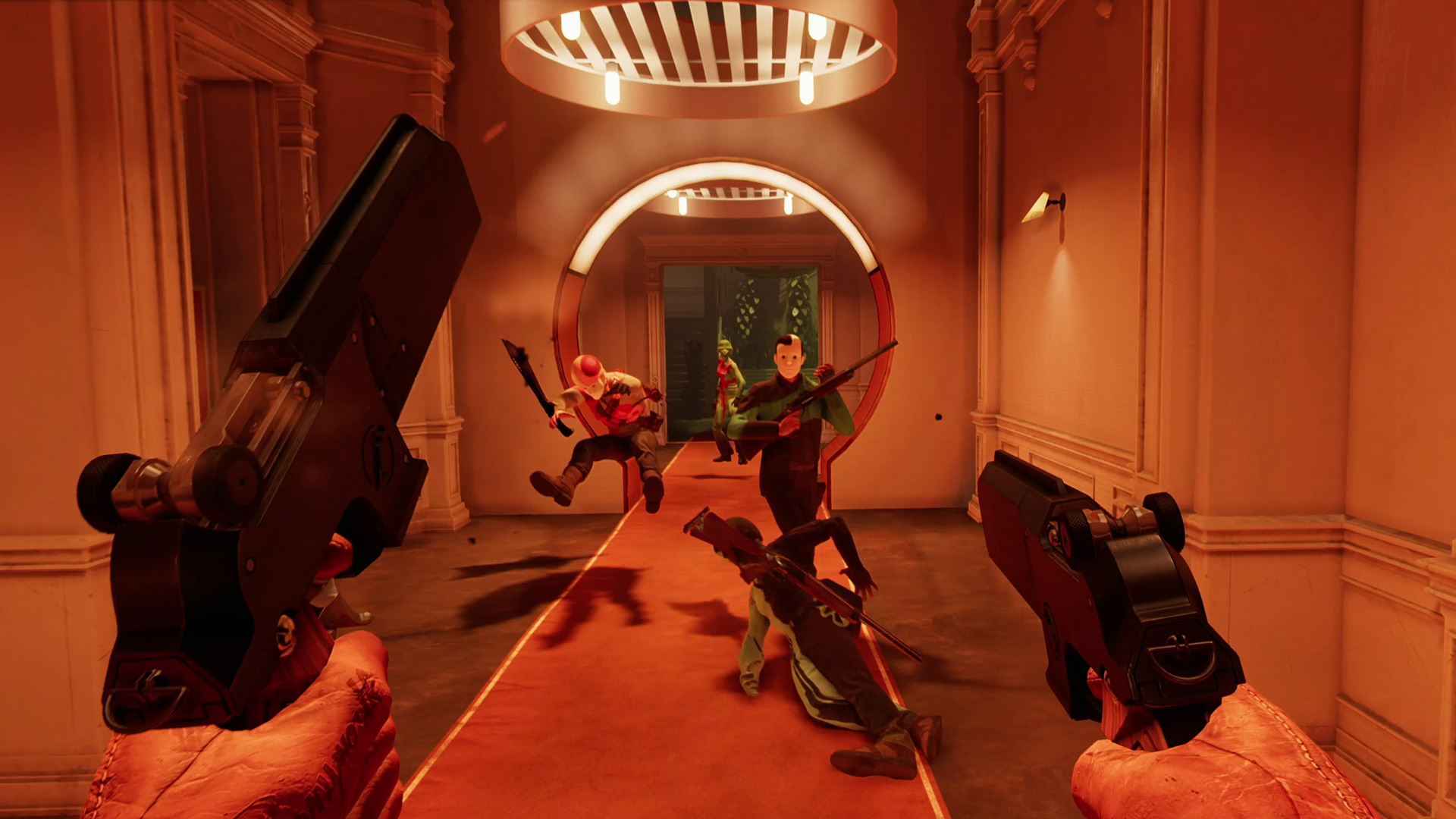
"Because of the nature of the time loop, you're going to have to find the tools you need and improvise in the missions."
Dinga Bakaba, game director
Deathloop promises more pliancy in its molecular design than anything the studio has created in the past. Where Dishonored tied progression through its districts to a linear succession of levels, Deathloop presents its own as large, open-ended sandboxes that you are free to explore and play around in. Each has its own story to tell, weather patterns to take advantage of, mysteries to be uncovered, and information to be internalised. Individual opportunities will only reveal themselves at certain times of the day, or if particular tasks are completed or milestones reached.
In essence, you are always hunting for the next shortcut; ways to push the Visionaries out of their comfort zones and into proximity with another, as you won't be able to take all eight down one-by-one. Instead, you'll need to find methods of killing two or three heavily-armed birds with one stone (or shotgun round to the head, whatever comes naturally to you). "We want players to be asking themselves, 'well, what happens if I do this?' There is a lot of variation in things to see and to experiment with," Bakaba continues.
"For instance, you might find two guards complaining about how lame it is to spend their first day in the time loop digging a tunnel. You can kill them, like any other enemy, but if you don't, you come back a bit later during the day, and they will have dug that tunnel. That might be a nice passage into another area…" Deathloop is a complex web of cause and effect, where opportunities only present themselves to those who are willing to experiment, explore, and push the limits of its immersive and pliable design.
Player expression is a hallmark of the Arkane design philosophy. This studio is renowned for its ability to engineer open-ended genre hybrids, games that blur the line between adventure, first-person shooter, immersive sim, and role-playing. The results are interactive experiences that bend and never break, indulging our intuition and imagination at every turn. Bakaba says that Deathloop "continues this tradition, where we don't necessarily force players to use any one power or ability anywhere in our games. It's really free; you have this toolset, and you can use it however you want to."
Locked and loaded
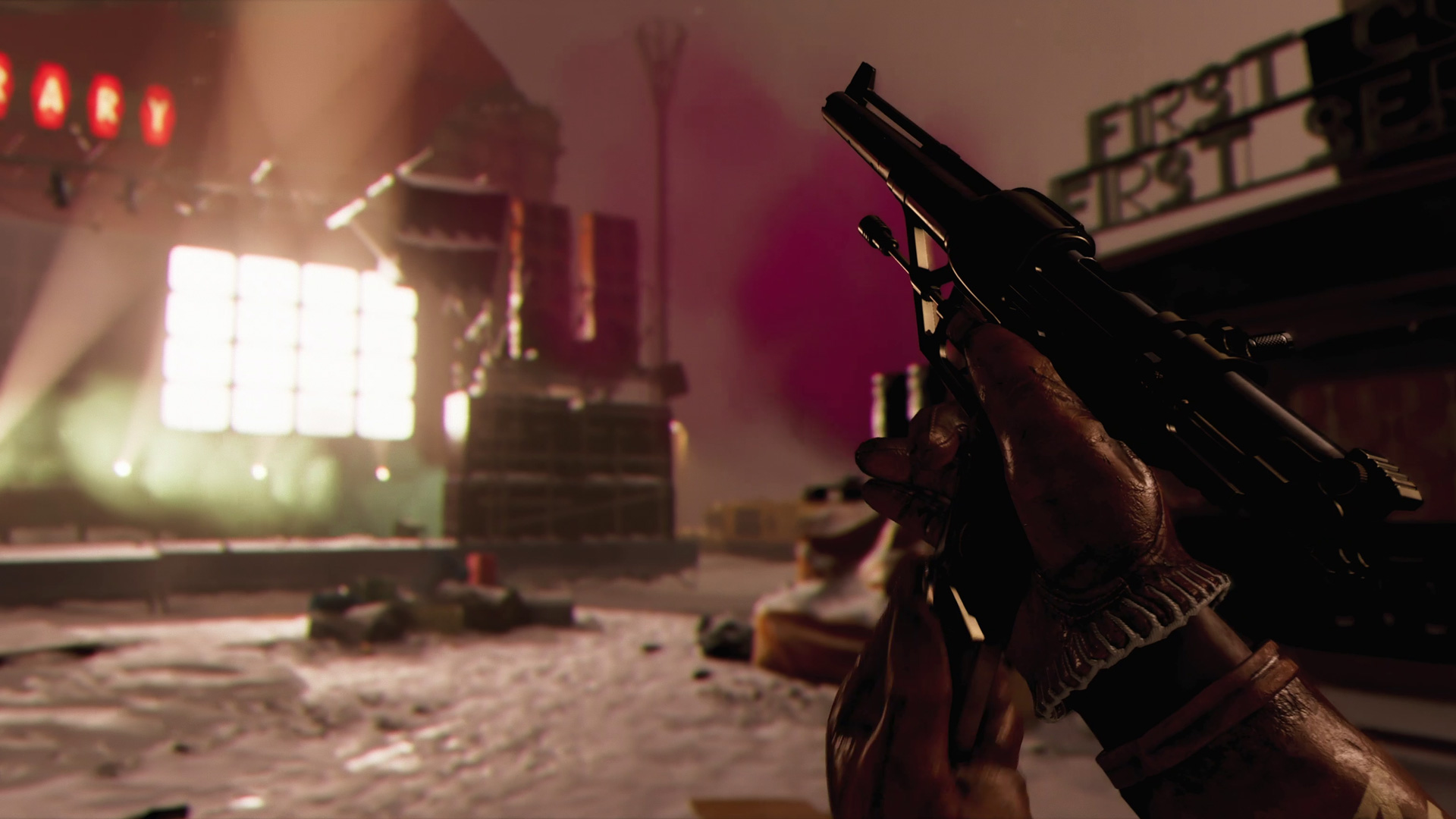
If Dishonored and Prey were carefully penned love letters to the immersive sims released between 1999 and 2000, Deathloop is positioned as a fresh take on the FPS for the next generation. It is more overtly action-orientated than anything Arkane has put out in its 20-year history, but that isn't to say the studio is walking away from immersive role-playing entirely. "People who played all of our past games, like Dishonored or Dark Messiah of Might and Magic, will not feel very out of place. We wanted to use some familiarity to build originality through other aspects of the game," says Bakaba.
That means that Arkane's penchant for tightly designed levels that promote verticality and experimentation will return, as will the studio's aptitude for filling locations with character and characters that you'll enjoy killing time and time again. Like Dishonored 2, you'll still have an array of supernatural powers available to you, now complemented by an arsenal of weapons that pack a time and space splitting punch. From the Fourpounder pistols that pack enough velocity to push approaching Eternalists through windows to the silenced PT-6 Spiker nail gun that'll let you pop heads from the relative safety of a rooftop, the focus is undoubtedly on the combat experience this time out.
However, what we don't yet know is how easily you'll be able to carry your favourite weapons between loops. "In the beginning, because of the nature of the time loop, you're going to have to find the tools you need and improvise in the missions. Whether it's because you died or because you reached the end of the day and the loop reset, you will start over with just your basic gear," says Bakaba, although he does tease that on-site procurement won't always be necessary. "There is something I cannot talk about that happens somewhere in the adventure that changes the rules for that, and then you can start progressing in a different way."
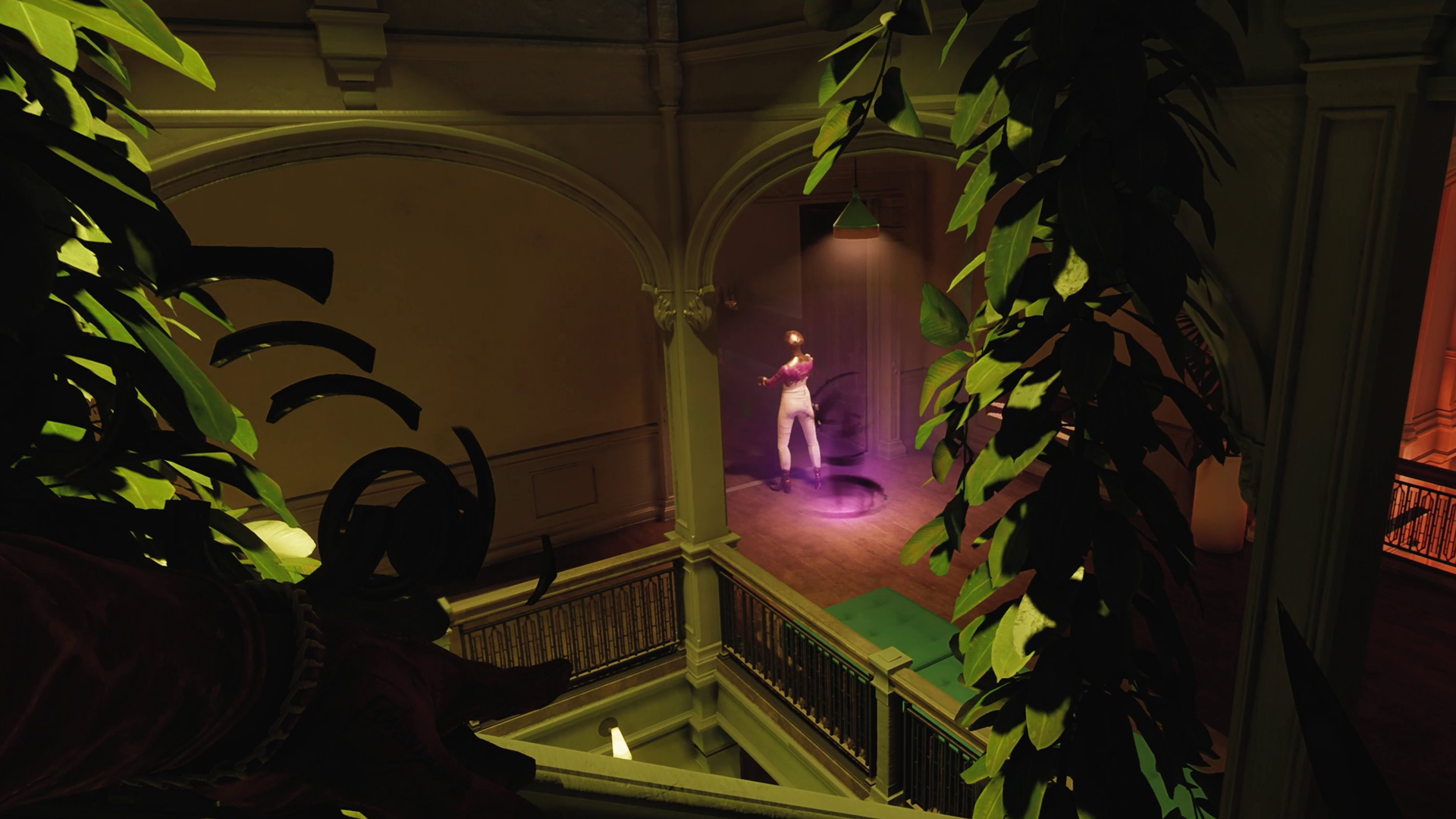

Bakaba says that he's unable to detail progression because of its ties to the central narrative. However, he did confirm that when you're ready to leave a time period and district you don't immediately transition to the next. Instead you, as he so mysteriously put it: "get back to your… well, let's say hub, but it isn't a hub." Whether this is a way for you to retain specific weapons, trinkets, and abilities remains to be seen. But in a world of regeneration, a supernatural storage unit isn't out of the realms of possibility.
The phenomenon on Blackreef isn't natural, but rather engineered by the Visionaries that run the AEON Program. Killing one of these marks doesn't just get you one step closer to breaking the cycle; it also grants you new powers to assist you in your journey. "Blackreef is a special place in the world. It allowed the AEON Program to make breakthroughs, like the infusion of paranormal forces into small objects – and that's what we call the Trinkets. Those are similar to the bone charms that we had in Dishonored, which can provide passive benefits," says Bakaba of the buffs you'll be able to obtain to assist you in your adventure. "Then they pushed the resource forward, and they managed to do something that allows you to alter reality more actively, and they are all of the Slabs."
Slabs are Deathloop's version of Dishonored's supernatural abilities. We know of four so far: the ability to Cloak, which is called Aether; Karnesis, which lets Colt harness Telekinesis; Masquerade, which will allow its user assume the form of anybody on the island; and there's a shift slab that gives you the ability to teleport a short distance, although it is yet to be properly named. Bakaba tells me that "abilities are tied to the targets", so if you want to get your hands on one you'll need to chase down the corresponding Visionary first. While Arkane is yet to confirm just how many powers are available in the game, it would stand to reason that there will be eight to collect.
Egor Serling, the scientist that first harnessed the island's paranormal activity, holds the Aether slab. Aleksis 'The Wolf' Dorsey, the financier of the AEON Program, has Karnesis. We don't yet know what slabs Visionaries Ramblin' Frank Spicer, Harriet Morse, Dr. Wenjie Evans, Charlie Montague, and Fia Zborowska hold, but they will no doubt be key to completing your mission. Should you find a way to manipulate each target's day through proper investigation and subterfuge, you'll not only be able to pull them together for a multi-hit assassination within a single district and period of time, but walk away with additional powers to assist you against the next target. It's this puzzling nature that makes up the core of Deathloop's cycles.
The thrill of the kill
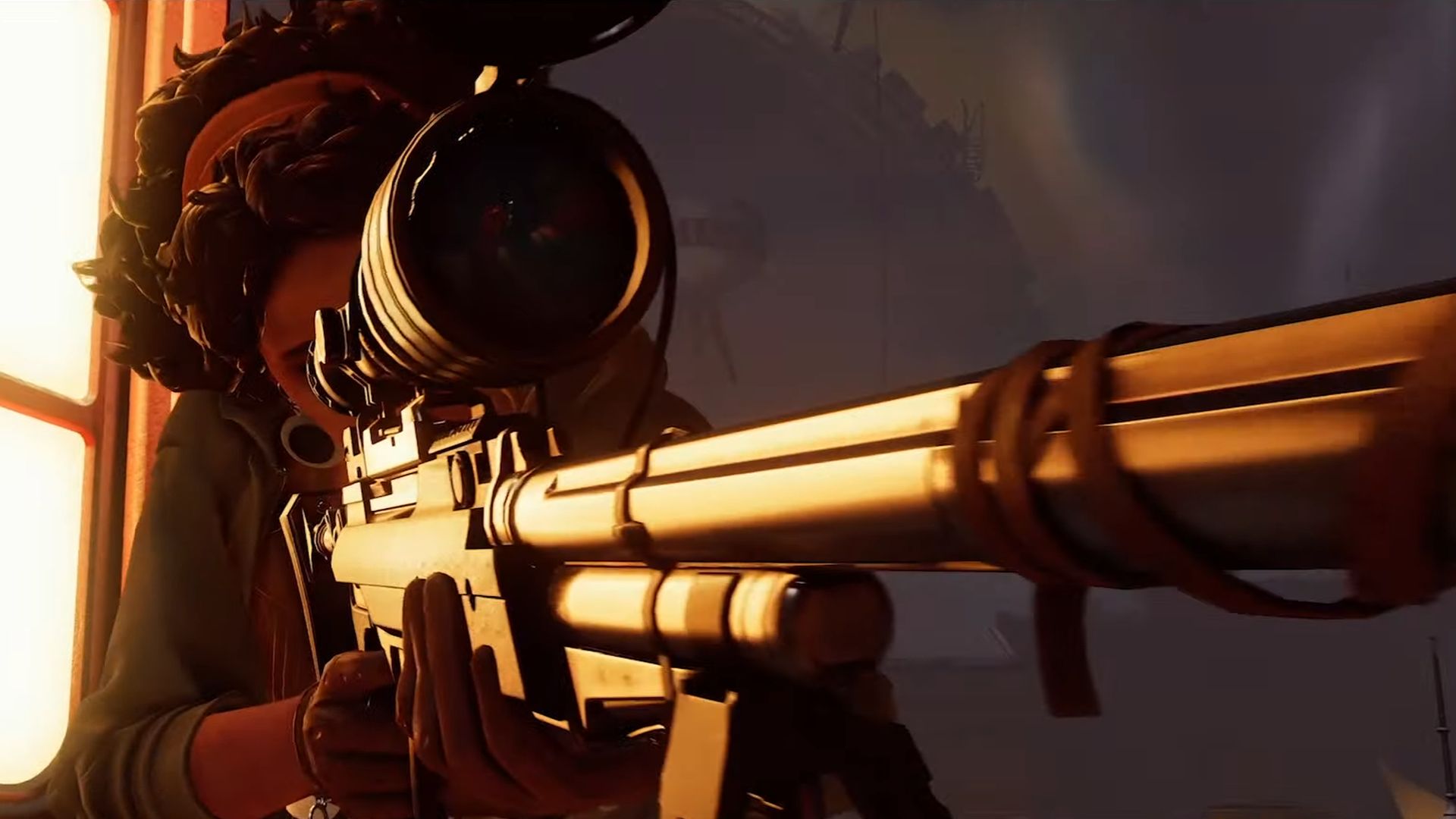
While Arkane is yet to confirm that Colt "The Captain" was once one of the Visionaries, we know that he was the predecessor of somebody in an influential role at Blackreef. Tried and found guilty of treason at the outset of the game, the Eternalists who reside on the island are eager to end his life to party in peace. Worse still, Colt's ongoing existence has attracted Juliana's attention – protector of the island, possessor of the Masquerade ability, and the primary variable in a game otherwise bound by routine.
Unlike the other Visionaries who will typically stick to predictable schedules and specific territories – unless, of course, you can find a way to subtly convince them to move to different parts of the island – Juliana floats freely, an active antagonist whose only job is to take you down and keep you trapped in the loop. Oh, and here's the kicker: there's a chance that a real player will be in control of Julianna, invading your campaign to bring your mission to an untimely end.
"There were definitely easier ways of implementing multiplayer," Bakaba laughs. "But we wanted to create a story full of memorable moments and, in some cases, memorable roadblocks – challenges that will surprise you. We thought that there's no better surprise than having someone with intelligence, their own rules, and wickedness to create those moments. As soon as somebody invades your game, there's this moment where you wonder 'what kind of encounter will this be?' I think this unpredictability is really fun."
Arkane is going to let you toggle PvP on or off, although it recommends that you set Julianna to be controlled by a mixture of AI and random players, that way you'll get the ultimate mix of unpredictability and chaos. For those of you eager to step into the hunter's role, Bakaba tells me that it isn't an option at the outset of the game, but rather something you unlock as you put time on the clock. "At some point, you'll have the ability to play as Julianna. Then you can go back to the main menu, and it is a separate option. The progression you make in the campaign, and the progression that you make as a hunter, are two separate things."
The wait is almost over

Deathloop is threatening to set an impossibly high benchmark for the FPS, right at the outset of a new generation. Arkane is putting an experience forward that is designed to surprise, as interlocking systems and a cyclical structure work in tandem to create a dizzying array of unique stories for players to not only uncover, but directly engineer.
The studio has built something in Deathloop that will encourage exploration, examination, and investigation. Each loop leads to a new discovery, to different paths forward and fresh ways to approach your objective. Every rebirth an opportunity to bend the game, with your continued experience on Blackreef fueling increasingly ridiculous ways to try and break the cycle. Our war against the fracture of time begins on May 21, 2021, when Deathloop arrives on PC and PS5 (a timed console exclusive for 12 months).
Big in 2021 is GamesRadar's month-long celebration of the new year. Every day, we will be exploring the most anticipated games on the near horizon with brand new previews and exclusive developer interviews.

Josh West is the Editor-in-Chief of GamesRadar+. He has over 15 years experience in online and print journalism, and holds a BA (Hons) in Journalism and Feature Writing. Prior to starting his current position, Josh has served as GR+'s Features Editor and Deputy Editor of games™ magazine, and has freelanced for numerous publications including 3D Artist, Edge magazine, iCreate, Metal Hammer, Play, Retro Gamer, and SFX. Additionally, he has appeared on the BBC and ITV to provide expert comment, written for Scholastic books, edited a book for Hachette, and worked as the Assistant Producer of the Future Games Show. In his spare time, Josh likes to play bass guitar and video games. Years ago, he was in a few movies and TV shows that you've definitely seen but will never be able to spot him in.


